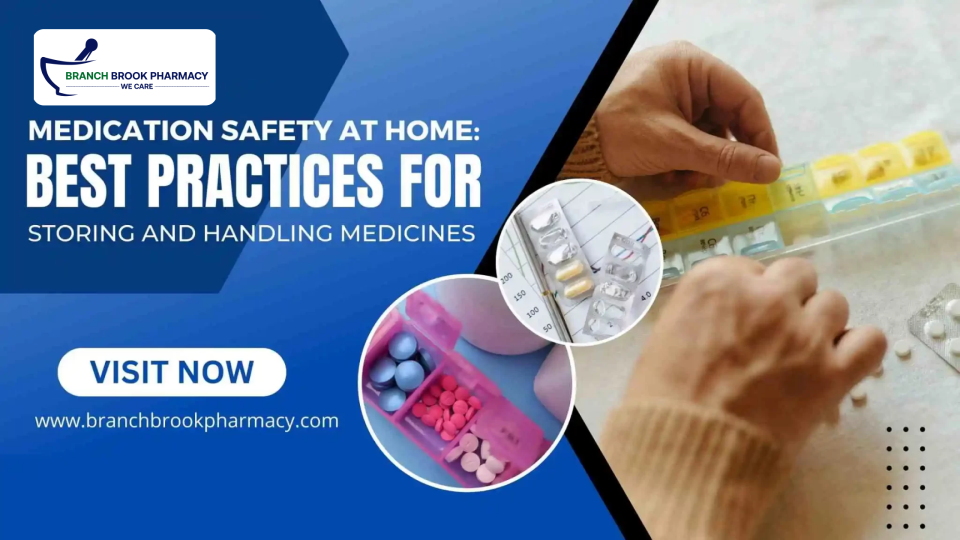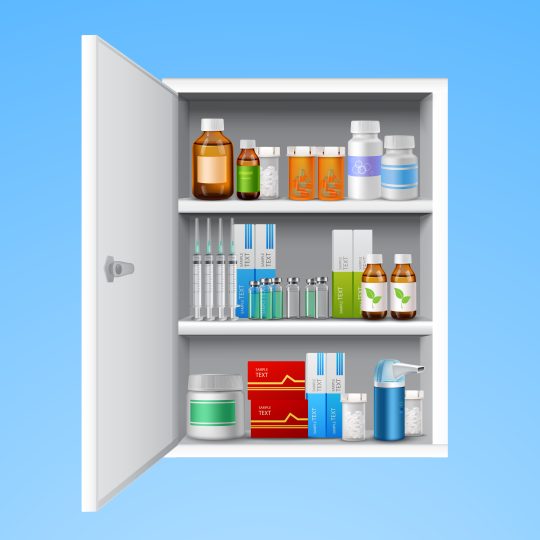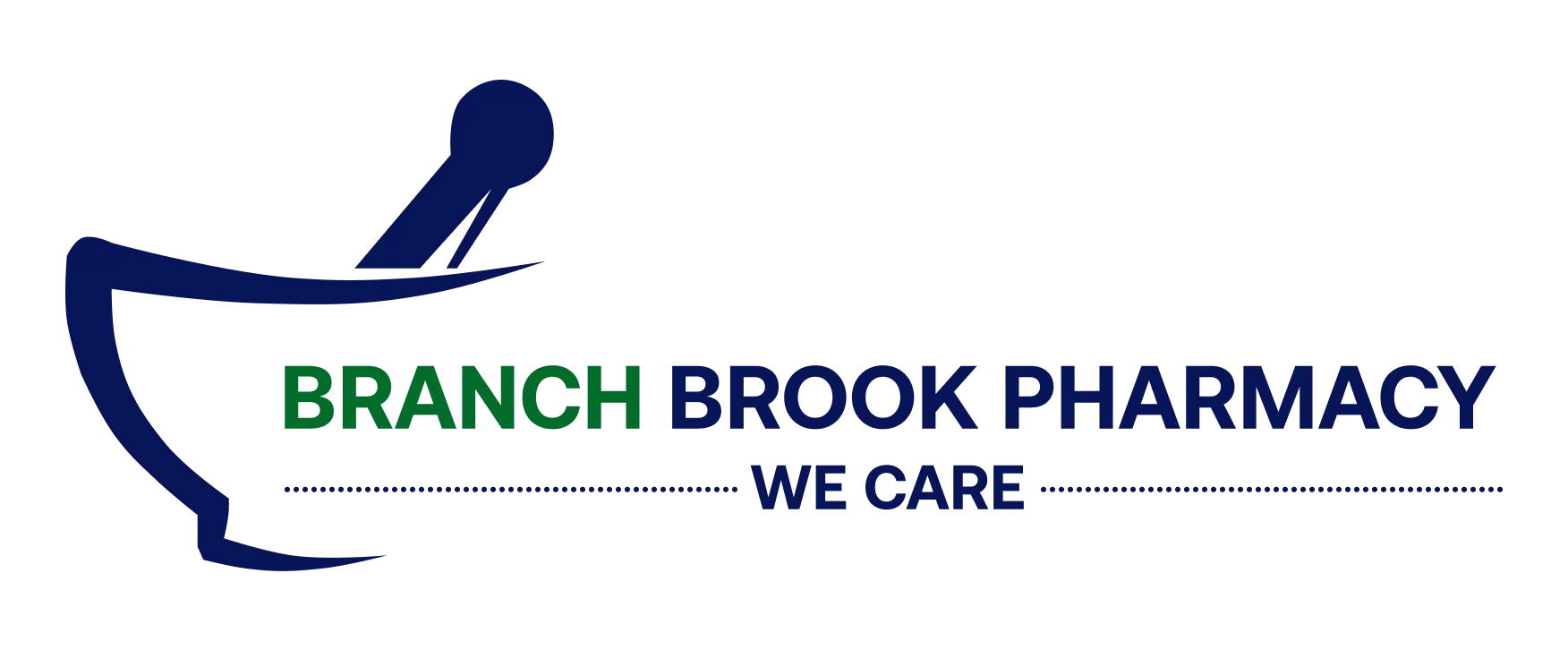
Ensuring medication safety at home is crucial for the well-being of every family member. Improper storage and handling of medicines can lead to severe consequences, including accidental poisoning, reduced efficacy, and dangerous drug interactions. This blog aims to provide comprehensive best practices for storing medicines and safe medicine handling tips to help you maintain a secure home environment. Branch Brook Pharmacy is dedicated to educating and supporting you in this endeavor.
Importance of Medication Safety at Home
Medication safety at home is not just about keeping medicines out of reach of children; it involves understanding how to store and handle medications properly. Medications that are not stored correctly can become less effective or even harmful. Additionally, incorrect handling can lead to accidental overdoses or missed doses, which can have serious health implications.
Best Practices for Storing Medicines

Following the label instructions is one of the most critical best practices for storing medicines. Always read and follow the storage instructions on the medication label. Some medicines need to be stored at room temperature, while others may require refrigeration. Keeping medicines in their original containers is another vital aspect. The original containers are designed to protect the medicine from light, moisture, and air, which can degrade the medication. Using child-resistant containers to store medicines is essential to prevent accidental ingestion by children. This is one of the fundamental home medicine storage guidelines.
Storing medicines in a cool, dry place is crucial as humidity and heat can affect the potency of medications. Avoid storing medicines in the bathroom or kitchen, where moisture and temperature fluctuations are common. Finally, always keep medicines out of reach. Place all medications out of reach and sight of children and pets, preferably on a high shelf or in a locked cabinet.
Proper Medicine Handling
Proper medicine handling is as important as storage. Before handling any medication, wash your hands thoroughly to avoid contaminating the medicine. Accurate dose measurement is vital; use the measuring device provided with the medicine or a proper measuring spoon for liquid medications. Never use household spoons as they can vary in size. Regularly check the expiration dates on all medications and dispose of any that are expired. Do not share medications as those prescribed for one person should never be shared with others. The dosage and type of medication are tailored to individual needs. Lastly, follow the prescribed dosage exactly as instructed by your healthcare provider. Do not alter the dosage or frequency without any consultation of your doctor.
Organizing Medicines at Home

Organizing medicines at home is essential for maintaining medication safety and adherence to prescribed treatments. A well-structured medication management system can prevent confusion, reduce errors, and enhance treatment effectiveness. Using a pill organizer is a highly effective method for keeping track of daily medications, ensuring no doses are missed. Pill organizers come in various sizes and configurations, allowing separation by day and time, simplifying complex regimens.
Maintaining an updated list of all medications taken by each family member, including dosages, frequencies, and prescribing doctors, is essential. This list should be easily reachable and regularly updated. Designate a specific area in your home, such as a cool, dry shelf, drawer, or cabinet, for storing and managing medications, ensuring it is out of reach of children and pets. Child-resistant containers and locks add an extra layer of safety.
Educate all family members about medication safety, emphasizing the importance of proper use and the risks of improper handling. Regularly review and update your medication storage and handling practices to adapt to changes in your regimen or household circumstances. Implementing these strategies creates a safe and efficient system for managing medications, and enhancing safety and health outcomes.
Key Points for Organizing Medicines at Home
- Use a Pill Organizer: Track daily medications and prevent missed doses.
- Label Medications Clearly: Include the name, dosage, and instructions.
- Separate Prescription and OTC Medications: Store them in different areas to avoid mix-ups.
- Maintain an Updated Medication List: List names, dosages, frequencies, and prescribing doctors for all family members.
- Designate a Specific Storage Area: Choose a cool, dry place out of reach of children and pets.
- Use Child-Resistant Containers: Enhance safety with child-resistant packaging and locks.
- Educate Family Members: Teach everyone about the importance of proper medication use and handling.
- Regularly Review and Update Practices: Adapt your system to accommodate changes in medication regimens or household circumstances.
By following these guidelines, you can maintain an organized, safe, and efficient system for managing medications at home, enhancing both safety and health outcomes.
Preventing Medication Accidents at Home
Accidental medication ingestion can be life-threatening, especially for children and pets. Here are some strategies for preventing medication accidents at home:
- Educate Family Members: Ensure that all family members, especially children, understand that medications are not candy and should only be taken when given by an adult.
- Be Mindful of Guests: If you have guests in your home, they should store their medications safely and keep their medicines out of reach from kids.
- Dispose of Medicines Safely: Proper disposal of unused or expired medications is crucial. Branch Brook Pharmacy can guide you on how to dispose of medications safely to prevent accidental ingestion.
- Use Safety Caps: Always use safety caps on medicine bottles and ensure they are closed tightly after each use.
- Monitor Medication Usage: Keep track of how much medication is being used. If you notice that a medication is running out faster than expected, it could be a sign that it is being used improperly.
Also Read: Nutrition and Supplements: What You Should Know
Conclusion
Maintaining medication safety at home requires diligence and awareness. By following these best practices for storing medicines and implementing safe medicine handling tips, you can ensure that your home is a safe environment for everyone. Remember to consult with Branch Brook Pharmacy for any questions or concerns regarding your medications. Our pharmacists are here to provide you with the support and information you need to manage your medicines safely and effectively. Incorporate these home medicine storage guidelines and proper medicine handling techniques into your daily routine to prevent accidents and ensure that your medications remain effective. By doing so, you are taking an important step towards safeguarding your health and the health of your loved ones.

